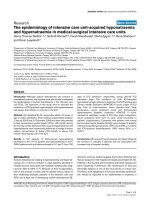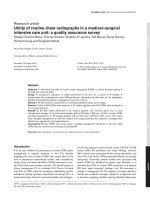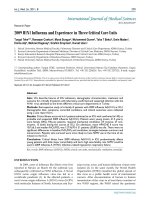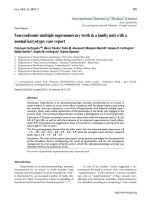unit tenses
Bạn đang xem bản rút gọn của tài liệu. Xem và tải ngay bản đầy đủ của tài liệu tại đây (156.39 KB, 39 trang )
TENSES:
1. Present tenses
2. Past tenses
3. Future tenses
PRESENT TENSES
Present
Simple
Present
Continuous
Present
Perfect
Present Perfect
Continuous
PAST TENSES
Past
Simple
Past
Continuous
Past
Perfect
Past Perfect
Continuous
FUTURE TENSES
Present
Simple
Present
Future
Continuous Simple
Future
be
Continuous going to
THE PRESENT TENSES
The Present tenses consist of:
•Present Simple
•Present Continuous
•Present Perfect
•Present Perfect Continuous
PRESENT SIMPLE
•vartojamas nusakyti nuolat
pasikartojantį veiksmą (often, always,
every day/week/ month/year, never,
sometimes, usually) :
I usually get up at 7 o’clock.
I watch TV every day.
She drinks ten cups of coffee a day.
• vartojamas nusakyti faktą:
Some birds fly south in winter.
My daughter has brown eyes.
Ronaldo comes from Brazil.
He works in a bank.
I live in a flat near the centre of
town.
FORMS
I
We
You
They
work
don’t work
do
I
we
you
they
Where
He
She
It
works
doesn’t work
work?
does
he
she
it
PRESENT CONTINUOUS
•vartojamas išreikšti veiksmą,
kuris vyksta dabar,
kalbamuoju momentu (now,
at the moment):
Don’t turn the TV off. I’m watching it.
You can’t speak to Lisa. She’s having a bath now.
•vartojamas išreikšti
laikiną veiklą, užsiėmimą:
Peter is a student, but he’s working as a waiter
during the holidays.
I’m living with my friends until I find a place of my
own.
FORMS
I
He
She
It
We
You
They
am
‘m not
is
isn’t going
reading,
are eating
aren’t
- Are you wearing jeans?
- Yes, I am. / No, I’m not.
- Is she reading a
newspaper?
- Yes, she is. / No, she isn’t.
PRESENT PERFECT
•vartojamas reikšti laiką, kuris
prasidėjo netolimoje praeityje ir
tęsiasi iki dabar (for):
I have lived here for 5 years.
•vartojamas išreikšti praeitį, kai
nežinomas tikslus laikas:
I have painted the room.
Peter has written two books.
•vartojamas išreikšti ką tik
pasibaigusį veiksmą:
I have just finished my homework.
•vis dar aktualų praeities
veiksmą, kurio padariniai
jaučiami dabar:
I’ve had a headache all day. I still feel the pain.
The time expressions we use
with Present Perfect:
for, since, already, just , ever,
never, yet, lately, recently,
so far, all day etc.
FORMS
I
you
we
they
he
she
it
- Have you done your
have
haven’t
written
has
hasn’t
homework?
- Yes, I have. / No, I
haven’t.
- Has she written a letter?
- Yes, she has. / No, she
hasn’t.
PRESENT PERFECT
CONTINUOUS
•vartojamas reikšti laiką, kuris
prasidėjo praeityje, besitęsiantį
arba ką tik pasibaigusį:
I have been waiting for twenty minutes.
•vartojamas kai norima pabrėžti
veiksmo tęstinumą, kuris prasidėjo
praeityje ir tęsiasi iki dabar:
I have been studying all afternoon.
FORMS
I
you have
we haven’t
they
he
has
been doing
she hasn’t
it
• How long have you
been doing your
homework?
• For five hours.
THE PAST TENSES
The Past tenses consist of:
• Past Simple
• Past Continuous
• Past Perfect
• Past Perfect Continuous
PAST SIMPLE
•Veiksmas, įvykęs praeityje ir
nesusijęs su dabartimi (veiksmo laikas
dažniausiai žinomas):
I saw Andy last month.
•Kartotinis, įprastas veiksmas, vykęs
praeityje ir nesusujęs su dabartimi:
She often played dolls when she was a child.
The time expressions we
use with Past Simple:
Yesterday, last, ago, in,
when etc.
FORMS
V /V
ed
2
(played / went)
did not + V
(did not play / go)
Did
... V?
(Did ..... play/go?)
PAST CONTINUOUS
•Veiksmas, vykęs tam tikru
momentu praeityje (veiksmo pradžia
ir pabaiga nežinomi):
At 9 o’clock last night we were watching TV.
•Du ar daugiau tuo pat metu
vykę veiksmai:
I was studying while my brother was watching TV.
FORMS
You
We
They
I
He
She
It
were
weren’t
was
wasn’t
Ving
- Were you reading?
- Yes, I was. / No, I
wasn’t.
The time expressions we
use with Past Continuous:
while, when, at that time,
at ... o’clock last ..., etc.
PAST PERFECT
• Veiksmą, kuris įvyko prieš tam tikrą
momentą praeityje:
By six o’clock in the evening, Tom had finished all
his work.
• Veiksmą, įvykusį prieš kitą veiksmą
praeityje:
When he got to the airport, the plane had already
landed.









